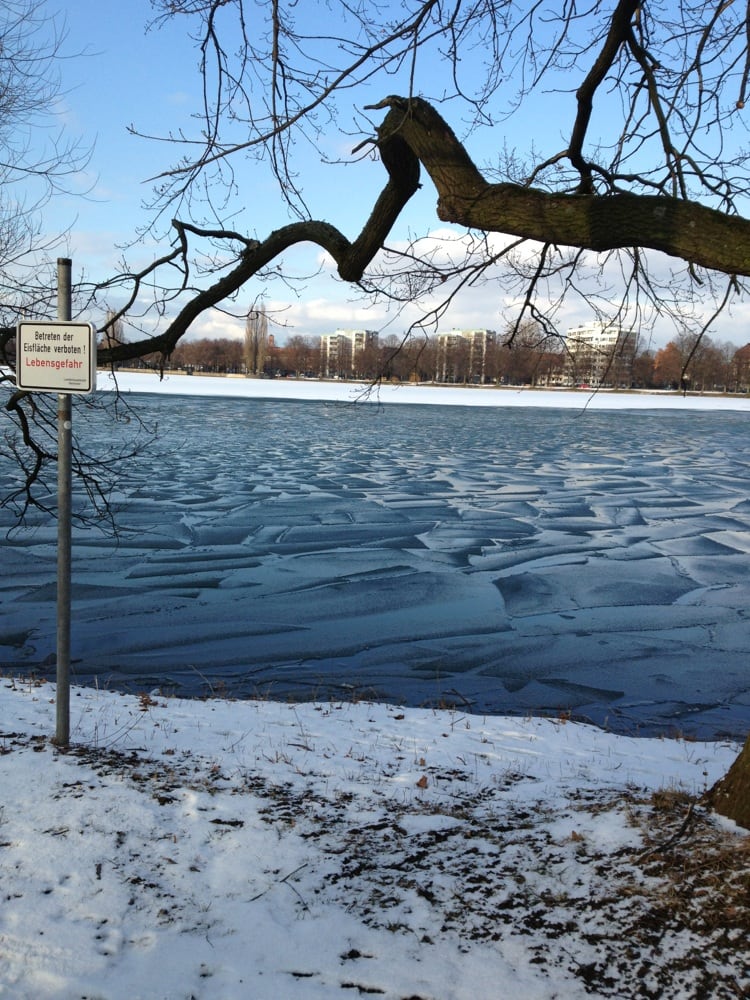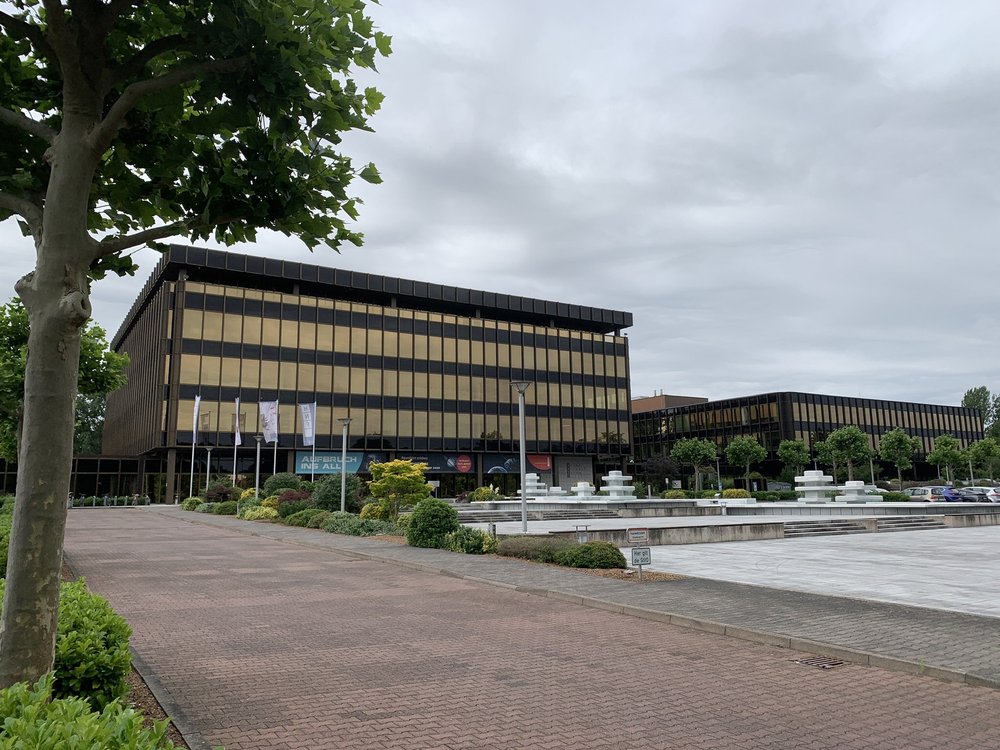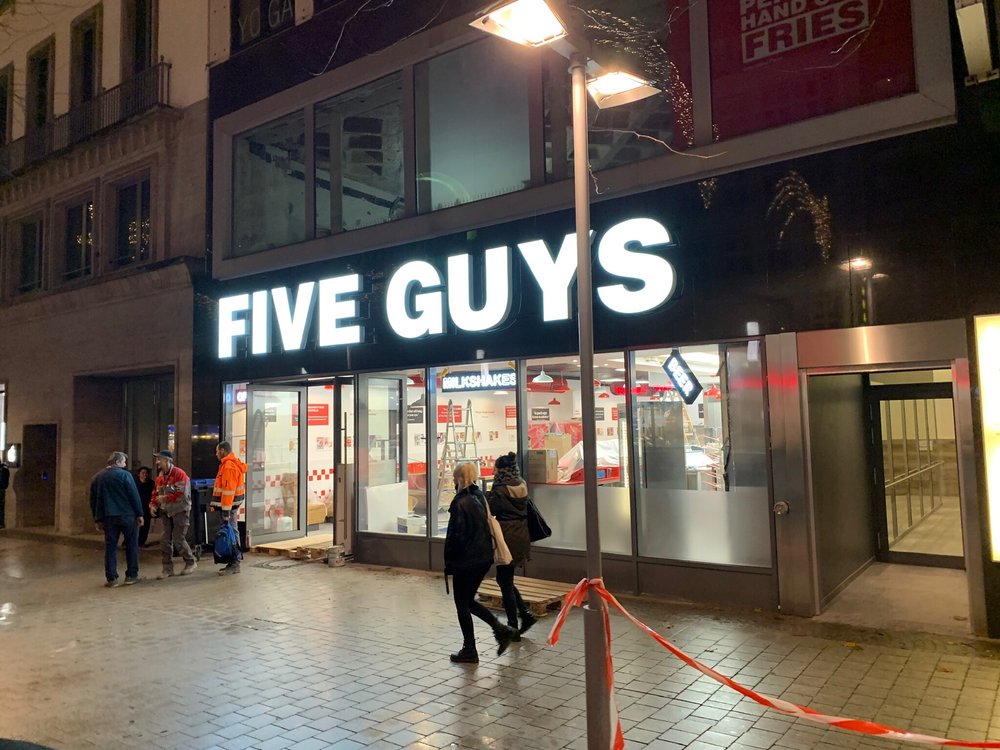Latest reviews
Eine Maschseerunde sind 6km. Das ist das erste was mir zum Maschsee einfällt. Und scheinbar denken mehrere so, denn selbst bei ungemütlichem Wetter drehen hier viele Läufer, Skater, Walker und Radfahrer ihre Runde(n). Und wer nicht mehr kann und auf halber Strecke liegen bleibt, der findet in der Nähe des Südufers des Sees die Station Döhrener Turm der Stadtbahn Üstra und kann damit dann seinen Weg fortsetzen. ;)
Auch sonst kann man rund um den Maschsee sehr viel Erholung finden. Ob bei einem Spaziergang im Schatten der Bäume oder auf einer der vielen Parkbänke sitzend einfach nur aufs Wasser schauen. Oder aber man macht eine Bootsfahrt auf dem Maschsee, die im Sommer sogar von einem neuen und umweltfreundlichen Solarkatamaran gefahren wird.
Durch seine zentrale Lage ist der Maschsee ein idealer Veranstaltungsort für viele Feste, stellvertretend sei hier nur das Maschseefest genannt, dessen Besuch ich nur empfehlen kann.

Der Maschsee, teilweise zugefroren, im Winter (Eigenes Werk. Lizenz: CC-BY-SA.)
An der Südseite des Sees gibt es eine Badestelle. Am Ostufer sowie an der Nordostecke können im Sommer Boote ausgeliehen werden und an der Nordwestecke gibt es mehrere Imbissbuden.
We have ordered from here quite a few times. Usually, it’s pretty good. The times when it’s not so good is when the food is too salty.
- The poblano pepper cheese grits and the milagros have always tasted great and are cooked well.
- The salsa is always way too salty and the last few times we ordered from here I didn’t even touch it.
- I’ve also had the shrimp and grits, but they didn’t first remove the tails, and they were extremely overcooked.
- My girlfriend has had some of their chicken dishes and their “campfire sandwich” and she enjoyed them.
- Stay away from their guacamole. It’s almost like a whip - way too light.
Overall, look to spend around $25~$30. From what we have experienced living here for almost a year, there’s not much else that’s as good. It’s decent, and good to choose if you want something cooked reasonably well for an okay price.
We ordered for pickup:
- Crunchy shrimp and avocado roll
- Chicken lo mein
- Age[sic]d[/sic] dashi tofu
- Fried wontons
This place has amazing reviews on yelp and google. Unfortunately it’s been a common occurrence for us specifically for Jackson, TN to have amazing reviews for restaurants that have terrible food.
Everyone inside was nice, it was just the food. There was almost nobody there so I thought that maybe our food would be made with extra care (it was not).
- The sushi was bare-bones. It being cheap, I expected basic sushi but this kinda let me down. The shrimp is not fried, they just packed some crispy panko or something similar in with it.
- The tofu was not deep fried, like they claim on the menu. Seemed like maybe they just microwaved it. The menu item is called “Age Dashi tofu” - it included a small container of sauce that was super thin and didn’t add much of anything to it. Dashi is usually very concentrated so I highly doubt there’s any dashi in it.
- The lo mein was way too salty.
- The wontons were overcooked, almost burnt.
How would we grieve if we could order custom android replicas that will take the place of our deceased loved ones? What should the justice system of a moon colony look like? If we built a machine that always tells truth apart from lies, could we really handle the truth?
In her podcast Flash Forward, Rose Eveleth has explored questions like these since Barack Obama was still president of the United States. The premise is that by thinking about futures—dystopian or romantic, ridiculous or sublime—we become better equipped to shape the world we may one day live in.
A typical Flash Forward episode combines storytelling, interviews, and analysis to stimulate the imagination residing in the “spicy meatball between your ears”. Now, Eveleth has translated the same concept into book form.
The book explores 12 different futures through full-color comics created by 14 contributors, followed by short essays written by Eveleth. The comics take up much of the 271 pages, making this a very quick read.

Each comic about a possible (or impossible) future is accompanied by a short essay that explores the topic further. (Credit: Rose Eveleth (text) / Ziyed Y. Ayoub (art). Fair use.)
It’s a book about the future, but it’s firmly grounded in the social and political discussions of the present. For example:
-
In “Welcome to Tomorrowville”, artist Ben Passmore and Eveleth wonder how the biased algorithms of a “smart” city might reinforce historical patterns of racism and marginalization.
-
In “Never Lay Me Down to Sleep”, Matt Lubchansky portrays a world in which we can fully conquer sleep with pills, and the inevitable exploitation of workers that follows.
-
In “Unreel”, Chris Jones and Zach Weinersmith tell the story of a man who controls the world through deepfakes—initially with honest motives.
As with an anthology, the art, stories, and topics chosen will surely resonate differently with each reader. Some stories felt a little too stuck in the present to give me much to mull over (the animal rights story stands out to me here); others were a bit predictable (sleep is indeed important). It’s hard to explore questions of morality without getting preachy, and the book does not always succeed at it.
But whether in book or podcast form, Flash Forward is an engaging approach to thinking about the future, and I recommend it. It also helped me discover the work of artists I would otherwise not have known about. I’d love to see another volume, featuring new artists and new futures to chew on.
Von außen sieht der Bau ein bisschen aus wie der ehemalige Palast der Republik in Berlin. Innen ist es aber wesentlich moderner aufgebaut.

Aussenansicht des Heinz Nixdorf MuseumsForums in Paderborn (Eigenes Werk. Lizenz: CC-BY-SA.)
Die Exponate im Museum erstrecken sich von den Anfängen der Daten im zweiten Jahrtausend vor Christus bis hin zur heutigen Zeit. Dabei sind die Schritte und die Technik, anhand von sehr vielen Exponaten visualisiert, beeindruckend und machen einem unmittelbar bewusst, das man scheinbar auch schon zum alten Eisen gehört. Von Schreibmaschinen über Tonbandgeräte und Vermittlungsstellen der damaligen Bundespost bis hin zur heutigen Technik kommt mir sehr viel bekannt und vertraut vor.
Viele Exponate kann man anfassen und ausprobieren und dabei gefiel mir besonders die Vermittlungsstelle mit den Hubdrehwählern - einfach toll!
Interessant sind ebenfalls die Roboter, die einen zu einem gewünschten Bereich oder Exponat führen können.
Das Museum gibt viele Impulse in Sachen zeitgemäßer technischer Präsentation lässt jedoch, meiner Meinung nach, das finale etwas vermissen. Für den Eintrittspreis und Umfang der Ausstellung gibt es daher die zweithöchste Wertung von mir.
Vor langer Zeit war ich einmal in einem Ableger dieser Kette in London und hatte nur sehr gute Erinnerungen. Der Geschmack, die Konsistenz und der Service waren wirklich sehr gut. Dementsprechend hoch waren meine Erwartung an die Filiale in Hannover.

Aussenansicht der Five Guys Filiale in Hannover (Eigenes Werk. Lizenz: CC-BY-SA.)
Um es kurz zu machen: ich wurde in allen Punkten enttäuscht. Beim ersten Besuch, kurz nach Eröffnung, war der Service noch komplett unorganisiert und die Bedienung der Kasse schien unmöglich. Bei meinem zweiten Besuch war dann alles von den Pandemiemaßnahmen betroffen. Einziger Lichtblick: es gibt keine Papierlisten, die für alle eingesehen werden können. Daran können sich viele Gastronomen ein Beispiel nehmen.
Die Fritten sind in meinen Augen indiskutabel roh. Etwas mehr Zeit in der Friteuse wurden Wunder bewirken. Der Burger hat meine Erwartungen ebenfalls nicht erfüllt. Vielleicht waren meine Erwartungen zu hoch oder die Qualität war wirklich schlecht. Oder eine Mischung aus beidem.
Five Guys wird wahrscheinlich noch eine Chance nach der Pandemie bekommen. Vielleicht ist dann ja alles anders.
After reading reviews online, I had some expectations for this place and unfortunately I was disappointed.
Maybe the staff has changed, but this time around the server wasn’t particularly friendly.
I ordered the a set of two samosas and the Vegetarian Curry. I specifically asked if the curry was vegan, and the waiter confirmed it was. Apparently, it also accompanied a drink and ice cream, which I didn’t realize until it was too late. While this is partly my fault, the waiter, armed with the knowledge that I specifically asked for a vegan dish, brought me dairy ice cream anyway.
The samosas were good, but a little pricy (almost 600 yen for 2 pieces?). The curry tasted fine. The presentation could’ve been better, though. Maybe because the plates they use are pretty large, it gave the impression that there wasn’t much food on the plate. I’m still not sure if the portion was small or the plate too large. Either way, it wasn’t a great impression.
I didn’t have a good experience here, so I would recommend people go to La Quinua (Peruvian-Mexican food) or Vegetus Sara (Japanese food), which are all within walking distance to each other. Vegan options at Indian/Sri Lankan/Nepali restaurants are easy to come by wherever you go, so you can easily skip this place.
Pros: Food was alright
Cons: Small portions, inattentive customer service
The food was so good I ate here everyday during my three-day stay in Yakushima, and it was also great that the dishes were different every time. On my last day, I ordered the bento, which was delicious as well.
Asuka clearly puts a lot of love into what she cooks, and you can definitely feel it when you eat it. There were so many different kinds of tastes that were new to me. Everything was simple and delicious.
If you’re coming to Yakushima, I recommend you make this a priority as important as the tourist spots you’re planning to see. You won’t want to miss this place!
Pros: The food is amazing, the owner is super friendly, the atmosphere is relaxing
Cons: None
Are we born with brains that are blank slates waiting only to be filled with experience? And if so, why is it so difficult to simulate that same experience in a computer? Why can a sophisticated AI be easily tricked into thinking that a cat is guacamole or that a Granny Smith apple is an iPod? How have human brains managed to adapt to the diversity of environments across the globe, from the Stone Age to the Space Age?
In How We Learn: Why Brains Learn Better Than Any Machine … for Now, French neuroscientist Stanislas Dehaene shows that the “blank slate” hypothesis does not withstand scrutiny. Our brains are equipped, from birth, with specialized neural circuits that shape a child’s intuitions about physics, arithmetic, geometry, and probability.
Dehaene cites a large body of research (including his own) that shows how young infants’ brains make sense of the world using this “core knowledge”. This research has forced a re-appraisal of older psychological models that have become popular wisdom:
Incidentally, these results overturn several tenets of a central theory of child development, that of the great Swiss psychologist Jean Piaget (1896–1980). Piaget thought that young infants were not endowed with “object permanence”—the fact that objects continue to exist when they are no longer seen—until the end of the first year of life.
He also thought that the abstract concept of number was beyond children’s grasp for the first few years of life, and that they slowly learned it by progressively abstracting away from the more concrete measures of size, length, and density.
In reality, the opposite is true. Concepts of objects and numbers are fundamental features of our thoughts; they are part of the “core knowledge” with which we come into the world, and when combined, they enable us to formulate more complex thoughts. [p. 58]
Brains vs. Machines
Like a budding scientist, an infant’s brain forms predictions about the world and then adapts its wiring based on whether the predictions match reality. This neuroplasticity is powerful, but it is highest during early sensitive periods, and dependent on innate cognitive skills—a number sense, the ability to detect faces, to acquire languages, and so on.
Dehaene contrasts this with the current generation of artificial networks, which are closer to a “blank slate” on which the characteristics of a training dataset are gradually inscribed. As a result of this naive approach, AIs lack the human brain’s multifaceted reasoning skills—”for now”, as the book’s subtitle puts it.
Hinting at what tomorrow may bring, Dehaene cites examples of artificial neural networks modeled after human cognition. For instance, a 2008 algorithm for predicting the optimal structural representation of various datasets “rediscovered” human knowledge representations like the tree of life.
One may quibble with the author’s assertion that human brains learn “better” than machines, given that the latter have already excelled in specific domains. Just ask Go player Lee Sedol, who retired from professional play and called AI “an entity that cannot be defeated”.
A Theory of Learning
But the focus of the book are humans, not machines. The author’s goal is nothing less than a theory of learning that teachers, parents, and students can apply in practice. He suggests a model based on “four pillars of learning”: attention, active engagement, error feedback, and consolidation.
From these four pillars he develops concrete recommendations for educators. Many of them may match the instincts of progressive teachers: anxiety and stress prevent learning; students need to be engaged as individuals; sleep is essential. However, Dehaene is highly critical of unassisted discovery learning and the popular idea of learning styles.
Dehaene does not take a one-sided view in the “nature versus nurture” debate; instead, he explains the complex interplay between our biology and the world we inhabit. Biological evolution has placed constraints on us, but it has also allowed us to reason about the workings of our own brains, and to journey to other planets.
The Verdict
As a whole, I highly recommend Dehaene’s book. As befits the subject, he is a great (occasionally witty) teacher who uses straightforward explanations and illustrations in order to systematically advance the reader’s understanding of a complex subject.
While I found the author’s level of certitude—when he talks about animal intelligence or learning styles, for example—a bit off-putting at times, that too can be the mark of a teacher in love with their subject. It is a passion he successfully passes on to the reader.
Sehr gute Lage und ein sehr gutes Frühstücksbüffet waren die Gründe, uns hier ein Zimmer zu nehmen. Trotz der unmittelbaren Lage an einer vielbefahrenen Straße - PKW und Straßenbahn - war vom Lärm im Zimmer so gut wie nichts zu vernehmen. Durch die alte Bauweise waren die Mauern sehr lärmundurchlässig. Das gilt leider nicht für die Türen. Sehr schade, wenn nebenan Gäste untergebracht sind, die eine Tür nicht mit Klinke schließen können.
Blick ins Bad (Eigenes Werk. Lizenz: CC-BY-SA.)
Wen es interessiert, dem sei gesagt, das im TV kein deutscher Sender empfangsbar war aber wer kommt schon nach Prag um in die Glotze zu starren? Das Zimmer mit Bad im Allgemeinen und die Matratze im Besonderen waren ok.
Blick auf das Bett im Hotelzimmer (Eigenes Werk. Lizenz: CC-BY-SA.)
Aber das hat man schnell vergessen wenn man beim Frühstück ist. In dieser Preisklasse habe ich so etwas noch nicht gesehen. So eine umfangreiche Auswahl gibt es in Deutschland bei drei Sternen nicht.
Teil des Frühstücksbuffets (Eigenes Werk. Lizenz: CC-BY-SA.)
Frühstücksbuffet (Eigenes Werk. Lizenz: CC-BY-SA.)
Das Personal an der Rezeption ist nett, spricht sehr gutes English und ein bisschen Deutsch. Begrüßt und verabschiedet wird man mit einem tschechischen Schnaps und wer eine Frage hat kann sich sicher sein, das ihm geholfen wird.
